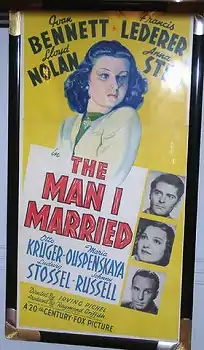The Man I Married
The Man I Married (alternative title I Married a Nazi) is an American 1940 drama film starring Joan Bennett and Francis Lederer.
| The Man I Married | |
|---|---|
 | |
| Directed by | Irving Pichel |
| Produced by | Darryl F. Zanuck |
| Written by | Oscar Schisgall (short story) Oliver H. P. Garrett |
| Starring | Joan Bennett Francis Lederer |
| Distributed by | 20th Century Fox |
Release date |
|
Running time | 77 minutes |
| Country | United States |
| Language | English |
Plot
A successful American woman, art critic Carol Cabbott (Joan Bennett) is married to German Eric Hoffman (Francis Lederer). They have a seven-year-old son, Ricky (Johnny Russell). They travel to Germany to visit Eric's father, whom he has not seen for ten years, although everybody tells them that going to Germany is foolish. A friend, Dr. Hugo Gerhardt (Ludwig Stössel), asks them to deliver money to, and somehow help his brother, the famous philosopher Gerhardt, who has been arrested and imprisoned in a concentration camp.
When the Hoffmans reach Berlin, they are met at the station not by Eric's father but by his old schoolmate Frieda (Anna Sten). His father, an elderly director and owner of a factory, tells them he wants to sell everything and leave Berlin, as he can no longer stand the hostile atmosphere. Even his butler is a Nazi, and Frieda is always around. An active enthusiastic Nazi, Frieda drags Eric to Nazi gatherings until finally he does not want to return to America, but wants to keep the factory and remain in Germany. His wife Carol, however, feels uneasy about staying there, and as time passes she recognizes her husband less and less.
While he goes to Nazi gatherings, she tries to find out something about Gerhardt, with the help of Kenneth Delane (Lloyd Nolan), a foreign correspondent in Berlin, who has a prophetic understanding of the demise of Nazi Germany. They find out Gerhardt has been killed, so she gives the money to his widow. They witness scenes of deliberate cruel denigration of people by Nazis.
Eric tells Carol that he wants to marry Frieda, who has put all sorts of things in his mind. Carol reluctantly agrees, but they quarrel over custody of their son. Finally Eric's father warns his son that if he does not let the son return with his mother to the United States, he will go to the police and tell them that Eric's mother was a Jewess. Eric is devastated, and Frieda leaves him, disgusted. Carol and Ricky leave for New York. Delane, who had hoped to get a leave to go back home, takes them to the station and tells Carol he has to stay "for the duration".
Cast
- Joan Bennett as Carol Hoffman
- Francis Lederer as Eric Hoffman
- Lloyd Nolan as Kenneth Delane
- Anna Sten as Frieda
- Otto Kruger as Heinrich Hoffman
- Maria Ouspenskaya as Frau Gerhardt
- Ludwig Stössel as Dr. Hugo Gerhardt
- Johnny Russell as Ricky
- Lionel Royce as Herr Deckhart
- Frederick Vogeding as Traveller
- Ernst Deutsch as Otto
Reception
In 1940, New York Times reviewer Bosley Crowther called the "anti-Nazi propaganda film" "restrained", "frank and factual" and "generally entertaining cinematically".[1] He singled out Lederer's performance for praise, but of Bennett he wrote, "she does little more than model dresses and express incredulity."[1]
References
- Bosley Crowther (August 3, 1940). "The Man I Married (1940) THE SCREEN; 'The Man I Married,' a Drama of Inside Germany, at the Roxy". The New York Times. Retrieved 2008-08-03.